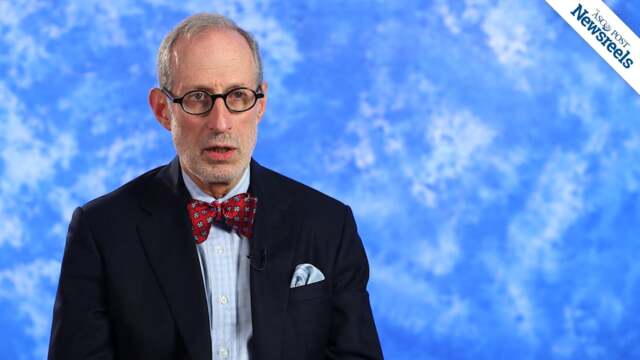Presurgical Targeted Therapy Delays Relapse of High-Risk Stage III Melanoma
A pair of targeted therapies given before and after surgery for melanoma produced at least a sixfold increase in time to progression compared to standard-of-care surgery for patients with stage III disease, Amaria et al reported in The Lancet Oncology. Patients who had no sign of disease at surgery ...
Study Finds Desmoplastic Melanoma Highly Responsive to PD-1/PD-L1 Blockade
Desmoplastic melanoma is a rare subtype of melanoma that is commonly found on sun-exposed areas, such as the head and neck, and usually seen in older patients. Treatment is difficult, as these tumors are often resistant to chemotherapy and lack actionable mutations commonly found in other types of...
Durable Complete Responses After Discontinuation of Immunotherapy in Metastatic Melanoma
As reported in the Journal of Clinical Oncology by Robert and colleagues, a high proportion of patients with metastatic melanoma achieving complete response on pembrolizumab (Keytruda) in the phase Ib KEYNOTE-001 trial maintained complete response for prolonged durations after treatment...
Growing Socioeconomic and Racial Disparities in Management of Brain Metastases
Increasing use of a potentially life-saving treatment for metastatic cancer is leaving too many vulnerable patients behind, according to a new study from Yale Cancer Center/Smilow Cancer Hospital published by Kann et al in JNCCN – Journal of the National Comprehensive Cancer Network. The...
Adjuvant Pembrolizumab Improves Recurrence-Free Survival in Stage III Resected High-Risk Melanoma
On January 8, Merck and the European Organisation for Research and Treatment of Cancer (EORTC) announced that the phase III EORTC1325/KEYNOTE-054 trial investigating pembrolizumab (Keytruda) as monotherapy for surgically resected high-risk melanoma met its primary endpoint of recurrence-free...
Study Finds Increased Risk in Common Cancers in Female Night Shift Workers
In 2007, the International Agency for Research on Cancer classified shift work with circadian disruption or chronodisruption as a probable human carcinogen. Now, a meta-analysis investigating whether long-term shift work increases the risks of common cancers in women has found that, overall, night...
FDA Accepts sNDA, Grants Priority Review to Adjuvant Dabrafenib/Trametinib in BRAF V600E/K Mutation–Positive Melanoma
On December 22, the U.S. Food and Drug Administration (FDA) accepted a supplemental New Drug Application (sNDA) and granted Priority Review designation to dabrafenib (Tafinlar) in combination with trametinib (Mekinist) for the adjuvant treatment of patients with stage III melanoma with BRAF V600E...
Nivolumab for Adjuvant Treatment of Melanoma Granted Regular Approval by FDA
On December 20, 2017, the U.S. Food and Drug Administration (FDA) granted regular approval to the anti–programmed cell death protein 1 (PD-1) monoclonal antibody nivolumab (Opdivo) for the adjuvant treatment of patients with melanoma with involvement of lymph nodes, or in patients with...
Melanoma Mutations: What You Need to Know
CLINICIANS ARE now well acquainted with BRAF mutations in advanced melanoma, but there is more to genomics in this disease than identifying BRAF and prescribing a BRAF inhibitor. At the 2017 Debates and Didactics Conference, held at Sea Island, Georgia, Melinda L. Yushak, MD, MPH, of Emory...
Balancing Immune-Related Adverse Events With Efficacy of Dual Checkpoint Inhibitor Therapy in Melanoma
MUCH PROGRESS has been made in the past decade in the treatment of patients with newly diagnosed metastatic melanoma. In the front-line setting, programmed cell death protein 1 (PD-1) monotherapy (nivolumab [Opdivo] and pembrolizumab [Keytruda]) and combined PD-1 plus cytotoxic...
Adjuvant Dabrafenib/Trametinib Combination Granted FDA Breakthrough Therapy Designation for Stage III Melanoma With BRAF V600 Mutation
On October 23, Novartis announced that the U.S. Food and Drug Administration (FDA) has granted Breakthrough Therapy designation for dabrafenib (Tafinlar) in combination with trametinib (Mekinist) for the adjuvant treatment of patients with stage III melanoma with a BRAF V600 mutation following...
FDA Accepts sBLA for Nivolumab in Resected, High-Risk, Advanced Melanoma
On October 16, Bristol-Myers Squibb announced that the U.S. Food and Drug Administration (FDA) has accepted for priority review its supplemental Biologics License Application (sBLA) for nivolumab (Opdivo) to treat patients with melanoma who are at high risk of disease recurrence following complete...
Long-Term Outcomes With BRAF and MEK Inhibition in BRAF V600–Mutant Metastatic Melanoma
As reported by Long et al in the Journal of Clinical Oncology, a 5-year landmark analysis of patients receiving dabrafenib (Tafinlar) and trametinib (Mekinist) for BRAF V600–mutant metastatic melanoma shows persistent overall and progression-free survival benefits. Study Details The...
Effectiveness of Sentinel Lymph Node Biopsy in Patients With Newly Diagnosed Melanoma
Research presented at the 9th World Congress of Melanoma supports the updated guideline recommendation that sentinel lymph node biopsy be performed in more patients newly diagnosed with melanoma, as it has the potential to save lives due to the information the procedure provides. This biopsy can...
Intratumoral Plasmid IL-12 With Electroporation in Stage III/IV Melanoma
OncoSec Medical Incorporated presented new clinical data on ImmunoPulse IL-12 (intratumoral pIL-12 [tavokinogene telseplasmid] with electroporation) at the 9th World Congress of Melanoma. “We are excited to share updated data from our phase II clinical monotherapy trial with ImmunoPulse ...
Axl Inhibitor BGB324 in Combination With Trametinib Plus Dabrafenib or Pembrolizumab in Advanced Melanoma
BerGenBio ASA announced that the randomized phase Ib/II clinical study of the Axl inhibitor BGB324 in combination with either the MAP kinase inhibitors trametinib (Mekinist) plus dabrafenib (Tafinlar) or the immune checkpoint inhibitor pembrolizumab (Keytruda) in patients with advanced melanoma is...
Regional Radiation Therapy Reduces Risk of Regional Recurrence in Node-Positive Cutaneous Melanoma
IN A LARGE single-institution study reported in the Journal of the National Comprehensive Cancer Network, Tobin Strom, MD, and colleagues found that regional radiotherapy was associated with a reduced risk of regional recurrence in patients with node-positive cutaneous melanoma, including those...
Nivolumab/Ipilimumab in Patients With Advanced Melanoma Who Did or Did Not Discontinue Induction Treatment due to Adverse Events
IN A RETROSPECTIVE pooled analysis of the CheckMate 069 and 067 studies reported in the Journal of Clinical Oncology, Dirk Schadendorf, MD, of the University Hospital Essen and the German Cancer Consortium, and colleagues found little difference in the efficacy of combined nivolumab (Opdivo) and...
Nivolumab Treatment Beyond Disease Progression in Advanced Melanoma
In a retrospective analysis reported in JAMA Oncology, Georgina V. Long, MBBS, PhD, of the Melanoma Institute Australia, North Sydney, and colleagues found that a substantial proportion of patients with advanced melanoma derived benefit from continued nivolumab (Opdivo) treatment after Response...
Expert Point of View: Alexander Eggermont, MD, PhD
BASED ON THE RESULTS of COMBI-AD1 and CheckMate 238,2 invited discussant Alexander Eggermont, MD, PhD, Professor of Oncology at Gustave Roussy in Paris, commented: “It’s a good day for melanoma!” In COMBI-AD, treatment with the combination of dabrafenib (Tafinlar) and trametinib (Mekinist)...
CheckMate 238: Nivolumab Shows Benefit as Adjuvant Melanoma Treatment
IN THE TREATMENT of malignant melanoma, immune checkpoint inhibitors are no longer just for metastatic disease, and the best type may be agents targeting the programmed cell death protein 1 (PD-1), according to results of CheckMate 238, presented at the European Society for Medical Oncology (ESMO)...
Adjuvant BRAF/MEK Inhibition Improves Survival in Resectable Melanoma
FOR PATIENTS with locally advanced, resectable melanoma harboring BRAF mutations, adjuvant treatment with BRAF/ MEK inhibition significantly improves overall survival, results of the COMBI-AD trial have shown. The study was presented at the European Society for Medical Oncology (ESMO) 2017...
Combination Therapy for Patients With Advanced Unresectable Melanoma
A phase II study has shown that the addition of the oncolytic viral agent talimogene laherparepvec (Imlygic) to ipilimumab (Yervoy) significantly increased the response rate in patients with advanced unresectable melanoma. These findings were reported in the Journal of Clinical Oncology by Chesney...
Single-Center Study of Adjuvant Beta-Blocker Therapy for Cutaneous Melanoma
An Italian single-center prospective cohort study suggests that adjuvant treatment with the beta-blocker propranolol significantly reduces the risk of melanoma recurrence in patients with stage IB to IIIA cutaneous disease. The findings were reported in JAMA Oncology by De Giorgi et al. Preclinical ...
Overview of the Phase III MSLT-II Trial
THE PHASE III MSLT- II TRIAL showed that completion dissection was not associated with improved melanoma-specific overall survival vs observation in patients with sentinel-node metastasis, although a benefit was observed in regional disease control. The findings were reported in The New England...
Blood-Based Biomarker: Predicting Efficacy of Immunotherapy in Patients With Melanoma
IN WHAT APPEARS TO BE the largest blood-based biomarker study of a checkpoint inhibitor, an RNA transcript–based gene classifier was able to predict for melanoma patients’ response to tremelimumab. The study was recently published in the Journal for ImmunoTherapy of Cancer.1 “Our study, in many...
MSLT-II Completion Lymph Node Dissection Trial: Practice Changing but Not Likely Practice Abandoning
PROBABLY THE MOST IMPORTANT advance in the treatment of newly diagnosed primary melanoma has been the incorporation of sentinel lymph node biopsy as part of initial surgical management. The routine use of sentinel lymph node biopsy, often termed “sentinel lymphadenectomy,” in appropriately...
Pooled Analysis Safety Profile of Combination Immunotherapy for Advanced Melanoma
In a retrospective study reported in the Journal of Clinical Oncology, Sznol et al have provided a pooled safety profile of combination nivolumab (Opdivo) and ipilimumab (Yervoy) treatment in patients with advanced melanoma. Study Details The study included data from 448 patients from a phase Ib...
Adjuvant Nivolumab vs Ipilimumab in Resected Stage III or IV Melanoma
The phase III Checkmate 238 trial has shown improved recurrence-free survival with adjuvant nivolumab (Opdivo) vs ipilimumab (Yervoy) in patients with resected advanced melanoma. The findings were reported by Jeffrey Weber and colleagues in The New England Journal of Medicine. Study Details In the ...
Adjuvant Dabrafenib and Trametinib in Resected Stage III BRAF-Mutated Melanoma
The phase III COMBI-AD trial has shown a significant improvement in relapse-free survival with the combination of the BRAF inhibitor dabrafenib (Tafinlar) and the MEK inhibitor trametinib (Mekinist) vs placebo as adjuvant therapy in patients with resected stage III melanoma with BRAF V600E or V600K ...
Adjuvant Nivolumab vs Ipilimumab in Resected Stage III or IV Melanoma
The phase III Checkmate 238 trial has shown improved recurrence-free survival with adjuvant nivolumab (Opdivo) vs ipilimumab (Yervoy) in patients with resected advanced melanoma. The findings were reported by Weber and colleagues in The New England Journal of Medicine. Study Details In the...
No Improvement in Melanoma-Specific Survival With Completion Dissection vs Observation for Sentinel-Node Metastasis
THE PHASE III MSLT- II TRIAL showed that completion dissection was not associated with improved melanoma-specific overall survival vs observation in patients with sentinel-node metastasis, although a benefit was observed in regional disease control. The findings were reported in The New England...
Is Complete Lymphadenectomy Still Standard of Care in Melanoma?
DOES COMPLETE lymph node dissection for sentinel node–positive melanoma still have a role in the management of this disease? That’s debatable. Although it does not improve overall survival over observation alone, complete lymphadenectomy may have other benefits, according to a dialogue at the...
Expert Point of View: Reinhard Dummer, MD, and Jeffrey Weber, MD, PhD
ASSUMING THE regimens evaluated in COMBI-AD and CheckMate 238 are both approved by the U.S. Food and Drug Administration for the treatment of high-risk resected melanoma, clinicians may be faced with a tough choice. ESMO experts and the study’s investigators weighed in on this issue in a lively...
Significant Improvement in Outcomes Reported With Adjuvant Therapy for Melanoma
FOR PATIENTS with malignant melanoma, the significant improvement in outcomes with targeted agents and antibodies against the programmed cell death protein 1 (PD-1) has now been observed in the adjuvant setting. Two landmark studies presented at the European Society for Medical Oncology (ESMO) 2017 ...
Overall Survival With Nivolumab/Ipilimumab, or Nivolumab Alone, vs Ipilimumab in Advanced Melanoma
Overall survival outcomes in the phase III CheckMate 067 trial indicate improved survival with nivolumab (Opdivo)/ipilimumab (Yervoy) vs ipilimumab and with nivolumab vs ipilimumab in patients with previously untreated advanced melanoma. These findings were reported in The New England Journal of...
ESMO 2017: Combination Targeted Adjuvant Therapy Doubles Relapse-Free Survival in Stage III Melanoma
Combination targeted adjuvant therapy with dabrafenib (Tafinlar) and trametinib (Mekinist) doubles relapse-free survival in patients with stage III BRAF-mutant melanoma, according to late-breaking results from the COMBI-AD trial presented on September 11 at the European Society for Medical Oncology ...
ESMO 2017: Adjuvant Nivolumab Superior to Ipilimumab in Surgically Resected Stage III/IV Melanoma
Adjuvant nivolumab (Opdivo) is superior to standard-of-care ipilimumab (Yervoy) in patients with surgically resected stage III/IV melanoma who are at high risk of relapse, according to late-breaking results from the CheckMate 238 trial presented on September 11 at the European Society for Medical...
Jeffrey S. Weber, MD, PhD, on Melanoma: Results of the CheckMate 238 Trial
Jeffrey S. Weber, MD, PhD, of New York University’s Langone Medical Center, discusses study results on adjuvant therapy with nivolumab vs ipilimumab after complete resection of stage III/IV melanoma (Abstract LBA8).
Karl D. Lewis, MD, on Melanoma: Results From the BRIM8 Trial
Karl D. Lewis, MD, of the Anschutz Cancer Pavilion, discusses study findings on adjuvant vemurafenib in patients with completely resected BRAF V600–positive melanoma at high risk for recurrence (Abstract LBA7).
Caroline Robert, MD, PhD, on Melanoma: Treatment With Nivolumab and Ipilimumab
Caroline Robert, MD, PhD, of Gustave Roussy, characterizes complete responses in patients with advanced melanoma who received the combination of nivolumab and ipilimumab, or nivolumab or ipilimumab alone (Abstract 1213O).
Immune-Related Toxicity and Time to Treatment Failure With Nivolumab Plus Ipilimumab in Advanced Melanoma
As reported in JAMA Oncology by Shoushtari et al, a single-center experience has shown a very high rate of clinically significant immune-related adverse events with nivolumab (Opdivo) plus ipilimumab (Yervoy) for advanced melanoma. Their findings suggest that the full course of four doses of...
Artificial Intelligence May Help With Earlier Detection of Skin Cancer
New technology being developed by researchers at the University of Waterloo and the Sunnybrook Research Institute is using artificial intelligence (AI) to help detect melanoma at earlier stages. The technology employs machine-learning software to analyze images of skin lesions and provide...
Pembrolizumab vs Ipilimumab in Advanced Melanoma: Final Overall Survival Analysis of KEYNOTE-006
The final overall survival analysis of the phase III KEYNOTE-006 trial showed maintained superiority of pembrolizumab (Keytruda) vs ipilimumab (Yervoy) in advanced melanoma. The results were reported by Schachter et al in The Lancet. An interim analysis showed improved progression-free and overall...
Dabrafenib Plus Trametinib in BRAF V600–Mutant Melanoma Brain Metastases
A phase II trial has shown that the combination of the BRAF inhibitor dabrafenib (Tafinlar) and the MEK inhibitor trametinib (Mekinst) produces responses in brain metastases in patients with BRAF V600–mutant melanoma. These findings were reported by Michael A. Davies, MD, of The University of...
Standard-Dose Pembrolizumab Plus Reduced-Dose Ipilimumab in Advanced Melanoma
In the phase IB KEYNOTE-029 study, standard-dose pembrolizumab (Keytruda) plus reduced-dose ipilimumab (Yervoy) produced high response rates in patients with advanced melanoma. These results were reported by Long et al in The Lancet Oncology. Study Details In the study, 153 patients with...
FDA Expands Approval of Ipilimumab to Include Pediatric Patients 12 Years and Older With Unresectable or Metastatic Melanoma
Today, the U.S. Food and Drug Administration (FDA) expanded the indication for ipilimumab (Yervoy) injection for intravenous use to now include the treatment of unresectable or metastatic melanoma in pediatric patients 12 years of age and older. Ipilimumab was evaluated in 2 trials of pediatric...
Expert Point of View: Lynn Schuchter, MD
DISCUSSANT LYNN SCHUCHTER, MD, the C. Willard Professor of Medicine at the Abramson Cancer Center at the University of Pennsylvania, Philadelphia, said the findings herald “a new era on two fronts…. Systemic therapy as initial treatment for patients with asymptomatic central nervous system (CNS)...
Drug Combinations Prove Effective Against Melanoma Brain Metastases
STUDIES PRESENTED at the 2017 ASCO Annual Meeting have shown that for melanoma that metastasizes to the brain, the combined use of checkpoint inhibitors and targeted agents can be effective. In COMBI-MB, 58% of patients responded intracranially to the BRAF inhibitor dabrafenib (Tafinlar) plus the...
Spark Discussions About Indoor-Tanning Devices
“Strong evidence suggests that using a tanning bed during adolescence or young adulthood can increase the risk of early-onset melanoma by over 40%,” Jeffrey E. Gershenwald, MD, wrote in an opinion piece for Newsweek.1 Dr. Gershenwald is Professor of Surgical Oncology, Medical Director of the...



